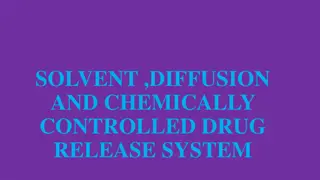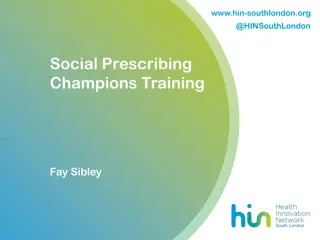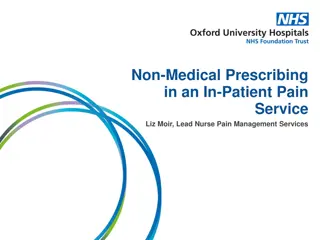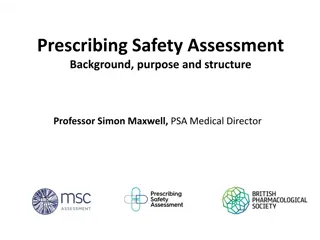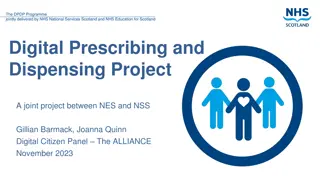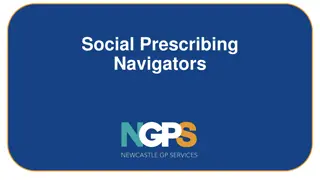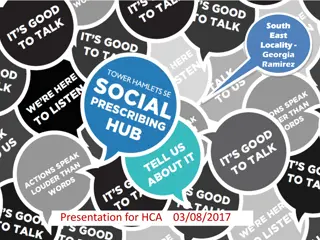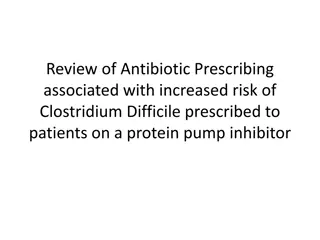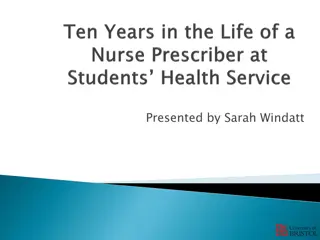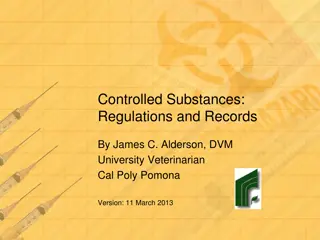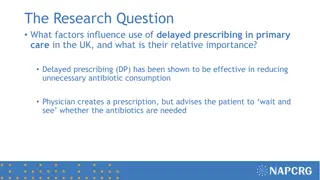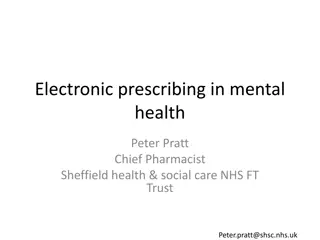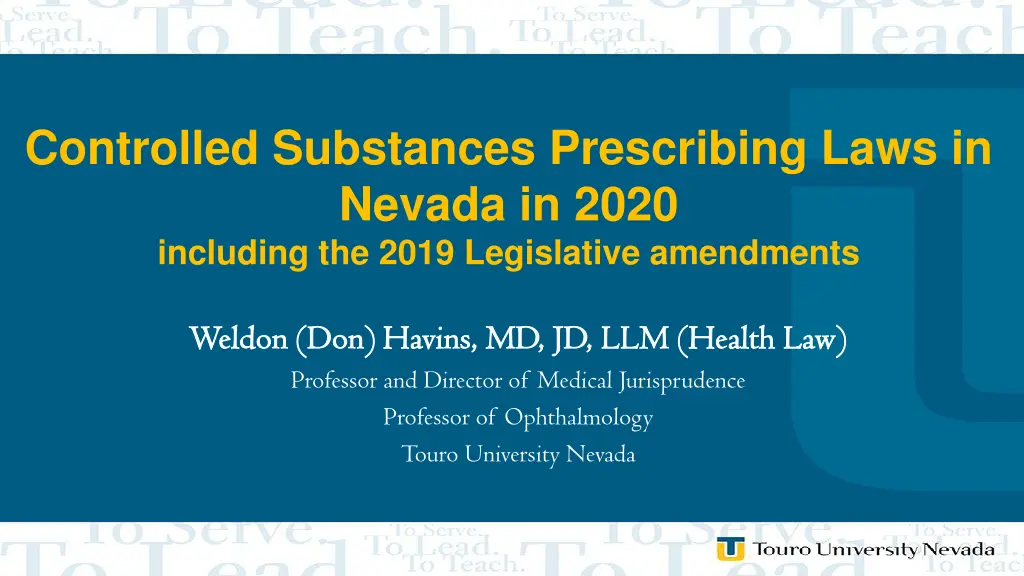
Nevada 2020 Controlled Substances Prescribing Laws & Amendments
Understand Nevada's 2020 Controlled Substances Prescribing Laws and the legislative amendments made in 2019 by Weldon Havins, MD, JD, LLM (Health Law). The regulations include mandatory CME training hours relating to the misuse of controlled substances and opioid prescribing for healthcare practitioners like physicians, PAs, and APRNs in Nevada.
Download Presentation

Please find below an Image/Link to download the presentation.
The content on the website is provided AS IS for your information and personal use only. It may not be sold, licensed, or shared on other websites without obtaining consent from the author. If you encounter any issues during the download, it is possible that the publisher has removed the file from their server.
You are allowed to download the files provided on this website for personal or commercial use, subject to the condition that they are used lawfully. All files are the property of their respective owners.
The content on the website is provided AS IS for your information and personal use only. It may not be sold, licensed, or shared on other websites without obtaining consent from the author.
E N D
Presentation Transcript
Controlled Substances Prescribing Laws in Nevada in 2020 including the 2019 Legislative amendments Weldon (Don) Havins, MD, JD, LLM (Health Law) Weldon (Don) Havins, MD, JD, LLM (Health Law) Professor and Director of Medical Jurisprudence Professor of Ophthalmology Touro University Nevada
DISCLOSURES NO CONFLICTS TO DISCLOSE The presentation will not include off-label use of medications. wehavins.com wehavins.com All course materials may be downloaded from this website
NRS 630.2535; NRS 631.344; NRS 632.2375; NRS 633.473; NRS 635.116; NRS 636.2881 Each (of the six) Board shall, by regulation, require each practitioner certified or registered to dispense 2 2 hours of training relating to the misuse and abuse of CS, the hours of training relating to the misuse and abuse of CS, the prescribing of opioids or addiction during each prescribing of opioids or addiction during each relicensure These CMEs may be used to satisfy 2 hours of any continuing education requirement. dispense CS CS to complete relicensure period period. (FYI, AB 105, effective July 1, 2017, requires 2 CME in suicide prevention suicide prevention.) By June 30, 2021, physicians, PAs, APRNs must comply. 2 CME hours every four (4) years every four (4) years
NBME Existing Mandate to Report NBME Existing Mandate to Report Violations Violations NRS 630.3062 The following acts, among others, constitute grounds for initiating disciplinary action or denying licensure: 6. Failure to report Failure to report any person any person the licensee knows, or has reason to know, is in violation of the provisions of this chapter or the regulations of the Board violation of the provisions of this chapter or the regulations of the Board within 30 days days after the date the licensee knows or has reason to know knows or has reason to know of the violation. is in 30 NRS 630.3062 The following acts, among others, constitute grounds for initiating disciplinary action or denying licensure: 3. Making or filing a report which the licensee knows to be false, failing to file a record or report as required by law report as required by law or knowingly or willfully obstructing or inducing another to obstruct such filing. failing to file a
NBOM Existing Mandate to Report Violations NBOM Existing Mandate to Report Violations NRS 633.511(1) The grounds for initiating disciplinary action pursuant to this chapter are: (p) Failure to report Failure to report any person the licensee knows, or has reason to know, is in any person the licensee knows, or has reason to know, is in violation of the provisions of this chapter or the regulations of the Board within violation of the provisions of this chapter or the regulations of the Board within 30 days after the date the licensee 30 days after the date the licensee knows or has reason to know knows or has reason to know of the violation. of the violation. (o) Making or filing a report which the licensee knows to be false, failing to file a record or record or report that is required by law report that is required by law or knowingly or willfully obstructing or inducing another to obstruct the making or filing of such a record or report. failing to file a
NRS 639.23507 Practitioners treating patients for cancer, sickle cell disease, hospice, or palliative care are required to: satisfy bone fide patient rule, query PMP, obtain informed consent (which may be verbal), and issue a valid prescription. A practitioner may issue a CS II, III, IV or an opioid in Schedule V for the treatment of a patient diagnosed with cancer or sickle cell disease or who is receiving hospice or palliative care without obtaining a patient utilization report if this will unreasonably delay care of the patient obtain PMP later.
NRS 639.23507 PMP Mandate Before initial CS prescription Practitioner must obtain a PMP utilization report obtain a PMP utilization report on the patient before issuing before issuing an initial prescription for a CS (II, III, IV) and every 90 days every 90 days thereafter. The practitioner shall: a. a. Review the Review the PMP (patient utilization) report PMP (patient utilization) report, , and b. Determine whether the patient has been issued another prescription for the same CS for ongoing treatment; if so, the practitioner shall not prescribe the CS, unless the practitioner determines that issuing the prescription is medically necessary. . and at least
NRS 453.162; NRS 639.2353 Each prescription for Controlled Substances Each prescription for Controlled Substances (CS) II, III, and IV must include: i. DEA number of the prescriber ii. ICD 10 diagnosis iii. Fewest number of days to consume the quantity of CS prescribed; number of refills (Example: Tylenol # 3, q. 4-6 h, 10 days. How many pills? 6 x 10 = 60)
Initial Prescription for a Controlled Substance (CS) Initial Prescription for a Controlled Substance (CS) (checklist) Check the PMP (and every 90 days thereafter) for same CS Review the PMP report Review the PMP report Determine whether the patient has been issued another prescription for the same CS for ongoing ongoing treatment treatment; if so, the practitioner shall not prescribe the CS, unless it is medically necessary Prescription: ICD 10 Diagnosis code; DEA # ; Minimum days consume at maximum dosage days to
USING CONTROLLED SUBSTANCES (CS) FOR THE TREATMENT OF PAIN
NRS 639.235 NRS 639.235 initial prescription for CS (II, III, IV) for pain, a practitioner must: bone fide relationship with the patient for Before issuing Before issuing an initial the treatment of the treatment of pain 1. Have established a bone fide relationship (a bona fide relationship between the patient and the person prescribing the controlled substance shall be deemed to exist if the patient was examined in person, electronically, telephonically or by fiber optics, including, without limitation, person, electronically, telephonically or by fiber optics, including, without limitation, through telehealth, within or outside this State or the United States by the person through telehealth, within or outside this State or the United States by the person prescribing the controlled substances prescribing the controlled substances within the 6 months immediately preceding within the 6 months immediately preceding the date the prescription was issued the date the prescription was issued) patient was examined in
NRS NRS 639.23911 639.23911 Before issuing a prescription for a CS (II, III, IV) for the treatment of pain, a practitioner must: 2. Establish a preliminary diagnosis preliminary diagnosis of the patient and a treatment plan treatment plan tailored toward treating the pain of the patient and the cause of that pain; 3. Document in the MR Document in the MR the reasons for prescribing the CS instead the reasons for prescribing the CS instead of an alternative treatment that does not require the use of a CS of an alternative treatment that does not require the use of a CS;
NRS 639.23911, NRS 639.23912 Before issuing an initial prescription for CS (II, III, IV) for the treatment of pain, a practitioner must: 4. Perform an evaluation and risk assessment which must include: relevantmedical medical history history directed to the source of the patient s pain and within the scope of practice of the practitioner scope of practice of the practitioner c. c. If the prescription is for a quantity of a CS II, III, or IV that is intended to be used in not less than If the prescription is for a quantity of a CS II, III, or IV that is intended to be used in not less than 30 days a. Obtaining and reviewing a relevant exam directed to the source of the patient s pain and within the b. Conducting a physical physical exam 30 days, , i i. Making . Making a good faith effort to obtain and review any care to the patientthat are relevant to the prescription that are relevant to the prescription, and Documentingefforts to obtain the MRs and conclusions from review in the MR of the patient d. d. Assessing the mental health and risk of abuse, dependency and addiction of the patient using methods supported by peer-reviewed scientific research and validated by a nationally recognized organization (Beck s Depression Inventory; POMI) any MRs from any anyother provider who have provided , and ii. ii. Documenting
BOP R047-18AP Sec. 5(2) good faith effort practitioner may consider: a. The time needed to provide care to the patient; b. The nature of the practice of the practitioner; and c. Whether the benefit of prescribing the controlled substance without obtaining the medical record outweighs the risk of doing so. (no apparent conflict with other NRS statutes)
NRS 639.239112; NRS 639.23912 e. Obtain informed consent informed consent to use a CS for the treatment of pain from: i. The patient, if the patient is 18 years of age or older or legally emancipated and competent to give such consent; ii. The parent or guardian of a patient who is less than 18 years of age and not legally emancipated; or iii. The legal guardian of a patient of any age who has been adjudicated mentally incompetent.
NRS 639.23911; NRS 639.23912 The informed consent informed consent must include, where applicable 1. potential risks and benefits of treatment using the CS including if a form of the CS that is designed to deter abuse is available the risks and benefits of using that form 2. proper use of the controlled substance 3. any alternative means of treating the symptoms of the patient and the cause of such symptoms 4. the important provisions of the treatment plan established for the patient where applicable, , information concerning:
NRS 639.23011; NRS 639.23912 The informed consent must include: 5. the risks of dependency, addiction and overdose during treatment using the CS 6. methods to safely store and legally dispose of the CS 7. the manner in which the practitioner will address requests for refills of the prescription 8. if the patient is a woman between 15 and 45 the risks to a fetus of chronic exposure to CS during pregnancy the risks of fetal dependency on the CS and neonatal abstinence syndrome
NRS 639.23911; NRS 639.23912 The informed consent informed consent must include: 9. if the CS is an if the CS is an opioid the availability of an opioid antagonist without a prescription, and if the patient is an unemancipated minor the risks that the minor will abuse or misuse the CS or divert the CS for use by another person, and ways to detect such abuse, misuse or diversion opioid
NRS 639.23912 A practitioner shall document a conversation in which a patient provided informed consent that meets the requirements in the medical record of the patient. If a patient provides informed written consent, the practitioner must include the document on which the informed consent is recorded in the medical record of the patient.
NRS 639.2391 Initial Prescription for Acute Pain Treatment with a CS including an opioid Unless the practitioner determines that the prescription Unless the practitioner determines that the prescription is medically necessary is medically necessary, a , a practitioner shall not prescribe CS II, III, or IV for acute pain for more than 14 days and, if the CS is an opioid, and the patient has never been issued an opioid or it has been more than 19 days since initial prescription for an opioid, prescription may not exceed 90 MMEs per day.
NRS 639.23911 If a practitioner a practitioner prescribes a CS (II, III, IV) for the treatment of pain, the practitioner the practitioner shall not issue more than one additional prescription that increases the dose of the CS unless the practitioner meets with the patient, in person or using telehealth, to reevaluate the treatment plan.
Initial Prescription Initial Prescription for CS Same as for all CS, plus: (checklist) Bone fide relationship If acute pain: CS for no more than 14 days; if prescribing an opioid, no more than 90 MMEs if opioid na ve, unless medically necessary Evaluation and risk assessment i. Relevant medical history ii. Physical exam directed to the source of the patient s pain and within the scope of practice of the practitioner iii. If the prescription is intended for 30 days or more, document good faith effort to obtain and review prior relevant medical records, and document conclusions of review in patient s MRs for CS (II, III, IV) (II, III, IV) for Pain for Pain
Initial Prescription Initial Prescription for CS for CS (II, III, IV) (checklist) (checklist) (II, III, IV) for for Pain Pain iv. Access mental health and risk of abuse, dependency, and addiction with qualifying tests Preliminary diagnosis and treatment plan to treat the patient s pain and the cause of the patient s pain Document in the MR the reasons for prescribing the CS instead of an alternative treatment that does not require the use of a CS
Initial Prescription Initial Prescription for CS (II, III, IV) for Pain for CS (II, III, IV) for Pain Obtain an informed consent to use a CS for the treatment of pain from the appropriate authority (person, parent, legal representative) The informed consent must include, when applicable, the required elements, plus, if an opiate, four (4) additional elements, and recorded in patient s MR. If the informed consent is written, included a copy in the patient MR. No more than one increase in dose of the CS for pain unless re-evaluation of treatment plan in-person or using telehealth
BOP mandate (new) The Board shall develop and disseminate to each professional licensing board that licenses a practitioner, other than a veterinarian, or make available on the Internet website of the Board [of Pharmacy] an explanation or a technical advisory bulletin to inform those professional licensing boards of the requirements of NRS 639.23507 and 639.2391 to 639.23916, inclusive, and any regulations adopted pursuant thereto. The Board shall update the explanation or bulletin as necessary to include any revisions to those provisions of law or regulations. The explanation or bulletin must include, without limitation, an explanation of the requirements that apply to specific controlled substances or categories of controlled substances.
NRS 639.23914 Pain Treatment using a CS for > 30 days If a practitioner intends to prescribe a controlled substance (II, III, IV) for more than 30 days for the treatment of pain, the practitioner must, not later than 30 days after issuing the initial prescription, enter into a prescription medication agreement with the patient, which must be: Documented in the patient s MRs; and updated at least once every 365 days while the patient is using the CS, or updated whenever a change is made to the treatment plan.
NRS 639.23914 Pain Treatment using a CS for > 30 days A prescription medication agreement must include: a. The goals of the treatment goals of the treatment of the patient b. b. Consent Consent of the patient to testing to monitor drug use when deemed medically necessary by the practitioner; c. A requirement that the patient take the CS only as prescribed; d. A prohibition on sharing medication with any other person;
NRS 639.23914 Pain Treatment using a CS > 30 days A prescription medication agreement prescription medication agreement must include: must include: e. A requirement that the patient inform the practitioner: : i. Of any other CS prescribed to or taken any other CS prescribed to or taken by the patient; ii. ii. Whether the patient drinks alcohol or uses marijuana or any other cannabinoid Whether the patient drinks alcohol or uses marijuana or any other cannabinoid while using the CS iii. Whether the patient has been treated for side effects or complications relating to the use of the CS, including whether the patient has experienced an overdose; and iv. iv. Each state Each state in which the patient has previously resided or had a prescription for a CS filled in which the patient has previously resided or had a prescription for a CS filled;
NRS 639.23914 Pain Treatment using a CS > 30 days A prescription medication agreement must must include: f. Authorization for the practitioner to conduct random counts of the amount of the CS in the possession of the patient; ; g. The reason the practitioner may change or discontinue treatment of the patient using the CS; and h. Any other requirements that the practitioner may impose. .
Using a CS for the treatment of pain for Using a CS for the treatment of pain for >30 days >30 days Prescription Medication Agreement must contain all 10 elements (plus any additional desired by the practitioner) must be renewed every 365 days, and updated after any change in the treatment plan
NRS 639.23913 Pain Treatment using a CS > 90 days Before prescribing a CS (II, III, IV) to continue to treat pain for 90 days or more, a practitioner must: a. Require the patient to complete an assessment of the patient s risk for abuse, dependency and addiction that has been validated through peer-reviewed scientific research; (COMM) b. Conduct an investigation, including appropriate hematological and radiological studies, to determine an evidence-based diagnosis for the cause of the pain;
NRS 639.23913 Pain Treatment using a CS > 90 days Before prescribing a CS (II, III, IV) to continue to treat pain days or more, a practitioner must: c. Meet with the patient, in person or using telehealth, to review the treatment plan to determine whether continuation of treatment using the determine whether continuation of treatment using the CS is medically appropriate CS is medically appropriate; and d. If the patient has been prescribed a dose of 90 MMEs or more of an opioid per day for 90 days or longer, consider referring the patient to a specialist to treat pain for 90 opioid specialist
NRS NRS 639.2391 639.2391 Pain Treatment using a CS Pain Treatment using a CS If practitioner prescribes more than 365 days of CS pain medication (II, III, IV) in 365 days, practitioner must document in MR the reasons, or for a larger quantity of CS (II, III, IV) than will be used in 90 days, the prescriber must document in the MR the reasons.
NRS 639.23913 Pain Treatment using an opioid If the practitioner decides to continue to prescribe a dose of 90 MMEs or greater per day, the practitioner must develop and document in the patient s MRs a revised treatment plan which must include an assessment of the increased risk for adverse outcomes.
Using a CS Using a CS (II, III, IV) (II, III, IV) for the treatment of for the treatment of Pain > (checklist) Pain > 90 days 90 days complete another assessment for the patient s risk of abuse, dependency, or addiction (COMM test) conduct an investigation to determine an evidenced-based diagnosis for the cause of the pain meet with patient, in-person or telehealth, to determine whether continuation with a CS for the treatment of pain is medically appropriate if patient is on a dose of 90 MMEs or greater, consider referring to a specialist if continuing 90 MMEs or >, document in MR the revised treatment plan, including risk for adverse outcomes
NRS 453.164 Board of Pharmacy (BOP) may access the PMP to identify any suspected fraudulent, illegal, unauthorized or otherwise inappropriate activity related to prescribing, dispensing, or use of a CS. Discovered information shall shall be reported to law enforcement or or licensing board. Dispensing Licensees must present proof of authorization to access the PMP to be relicensed [by BOP for CS certificate].
Board of Pharmacy authority to discipline anyone with a controlled substances certificate
To NRS 453 (Controlled Substances) the following section is added: The authority of the Board [of Pharmacy] to take disciplinary action to enforce the provisions of this chapter is not limited by the authority of any other regulatory body that may be authorized or required to take disciplinary action for the same conduct with respect to any license, registration, certificate or other professional designation issued and regulated by that regulatory body.
BOP R013-18AP Sec. 5. The Executive Secretary of the BOP may suspend or terminate, before a hearing, the Internet access of a practitioner or other person to the PMP if the practitioner or other person accesses the database in violation
Discipline by the Licensing Board of the prescriber
NRS 630.323; NRS 631.364; NRS 632.352; NRS 633.574; NRS 635.152; NRS 636.338 If licensing Board Executive Director (ED) licensing Board Executive Director (ED) receives complaint from law enforcement, BOP, or any other source, that the licensee has: has issued a a fraudulent, illegal, unauthorized or inappropriate CS prescription, or a pattern of such prescribing, or a patient (of the licensee) who has acquired, used or possessed a CS (II thru IV) as above, then:
review and evaluation NRS 630.323; NRS 631.364; NRS 632.352; NRS 633.574; NRS 635.152; NRS 636.338 ED, or designee notification if criminal investigation ongoing) ED, or designee or designee, reviews PMP licensee s information After review and evaluation review and evaluation, if ED, or designee may have issued a fraudulent, illegal, unauthorized or inappropriate prescription, the ED, or designee, may refer for criminal prosecution ED, or designee, may refer for criminal prosecution& the Board as if a written complaint had been filed against the licensee as if a written complaint had been filed against the licensee. After conducting an investigation and a hearing, if licensee is found guilty, the licensing Board must impose appropriate disciplinary action, to include additional CMEs. designee, must notify licensee as soon as practicable (may delay designee, determines that the licensee the Board must must proceed proceed
NRS 630.323; NRS 631.364; NRS 632.352; NRS 633.574; NRS 635.152; NRS 636.338 If the Board determines from investigation that the public health, safety, or welfare, of any patient is at risk of imminent or continued harm, the Board may summarily suspend licensee s authority to prescribe CS (II, III, IV) pending a determination upon the conclusion of a hearing to consider a formal complaint against the licensee.
NRS 630.323; NRS 631.364; NRS 632.352; NRS 633.574; NRS 635.152; NRS 636.338 The licensing Board must hold a hearing and render a decision concerning [whether to file] the concerning [whether to file] the formal complaint within 60 days 60 days of the summary suspension order for the Medical Board, Nursing Board, Podiatric Board, and Optometric Board, Or, within 180 days 180 days for Osteopathic Medical Board and Dental Board. formal complaint
NRS 630.323; NRS 631.364; NRS 632.352; NRS 633.574; NRS 635.152; NRS 636.338 The licensing Board shall adopt regulations providing for disciplinary action against a licensee for inappropriately prescribing a CS (II, III, IV) or violation of any statutes or regulations of the BOP, to include additional continuing education concerning prescribing CS II, III, IV.
NRS 630.23916 The BOP may adopt any regulations necessary or convenient to enforce the provisions of NRS 639. Such regulations may impose additional requirements concerning the prescription of CS II, III, IV for the treatment of pain. A practitioner who violates any provision of this act or any furthering regulations is: a. Not guilty of a misdemeanor; and [is] b. b. Subject Subject to professional discipline to professional discipline.
In Summary Mandates for initial prescription for all controlled substances materially improved this past Legislative session Mandates for prescribing controlled substances for pain less than 30 days materially improved Mandates for prescribing controlled substances for 30 days or more no significant change Licensure Discipline improved as to NO ATTESTATION of compliance required; however, BOP now has authority to independently discipline licensees of other Boards as to their CS certificate
Thank God He Stopped Talking!!! NOOO! funny picture


